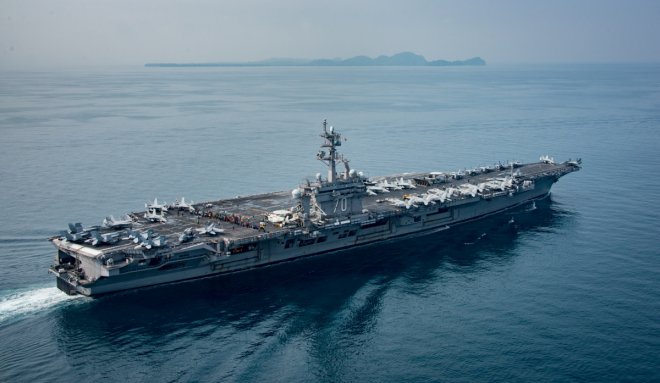
South Korea and the United States have started a separate joint naval exercise after completing their annual large-scale military drills on Sunday, triggering dire threats from nuclear-armed North Korea.
The massive "Foal Eagle" drill, which the defence ministry in Seoul said was ending as scheduled on Sunday, involved around 20,000 South Korean and 10,000 US troops. Another annual joint exercise known as "Key Resolve" ended last month.
Recently, tensions on the Korean peninsula have been running sky-high with sign of North Korea preparing a long-range missile launch or a sixth nuclear test - and with Washington refusing to rule out a military strike in response.
Both the drills have given rise to a conflict with North Korea. However, both Seoul and Washington insist they are purely defensive in nature, despite Pyongyang's claims that they are provocative rehearsals for invasion. Their conclusion normally signals a period of relative calm in North-South tensions, but this year the situation looks set to remain highly volatile.
US President Donald Trump has already warned of a possible "major conflict" while the North has carried out a series of failed missile tests, including one on Saturday, and a massive live-fire military exercise.
On Sunday, the South Korean defence ministry confirmed that a joint naval drill with a US strike group, led by the aircraft carrier USS Carl Vinson, was still ongoing in the Sea of Japan (East Sea). It said the exercises are aimed at verifying the allies' capability to track and intercept enemy ballistic missiles. The naval drill is expected to continue until sometime next week.
The North Korean state media reported that Pyongyang has threatened to attack the Carl Vinson, while a state-sponsored website said that it has also warned of a possible strike against a US nuclear-powered submarine dispatched to the area.
In an interview with the CBS television network's "Face the Nation" programme, Trump said that China is "putting pressure" on its ally North Korea to curb its weapons programmes. He added that if North Korea carries out another nuclear test "I would not be happy".
"And I can tell you also, I don't believe that the president of China, who is a very respected man, will be happy either," Trump said in excerpts of the interview released Saturday. When he was asked if "not happy" signified "military action," Trump answered: "I don't know. I mean, we'll see."
North Korea's failed missile test on Saturday came just hours after US Secretary of State Rex Tillerson warned the UN Security Council of "catastrophic consequences" if the international community - most notably China - failed to pressure the North into abandoning its weapons programme. Tillerson said military options for dealing with the North were still "on the table".
China has repeatedly pushed back at the idea that it alone holds the solution to curbing the North's nuclear ambitions, and warned that any use of US force would only lead to "bigger disasters".
Meanwhile, the tensions have also triggered some friction between Seoul and Washington. In a recent interview, Trump suggested that the South should pay for the $1.0-billion dollar THAAD anti-missile system that the US is deploying on its ally's territory.
However on Sunday, South Korea said US National Security Adviser H.R. McMaster had spoken by phone with his counterpart in Seoul and both sides had reaffirmed that Washington would bear the cost of the THAAD deployment, as initially agreed.
The South's presidential office quoted McMaster as saying that Trump's interview remarks "were made in a general context, reflecting the American public's hopes for (defense) cost sharing".
The two countries have had a security alliance since the 1950-53 Korean war, and more than 28,000 US troops are stationed in the South.









